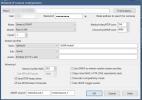@wtf911 I agree native web push support would be nice. I've thought a lot about it before and brought it up to the BI dev before, but if I recall he didn't respond to my email (this is pretty typical for such requests from me).
I see 3 challenges with natively supporting web push:
1. I personally do not use or care about alert notifications, and I've never even set them up before in the existing native apps. This means I am not very familiar with how notifications are done already, and I am not motivated to spend a lot of time working on it, which is required because:
2. I would consider it a failure if web push notifications were not at least as easy to set up as for Android/iOS. Dealing with the HTTPS requirement seems like the biggest part of this. Self-hosting HTTPS for every
Blue Iris user is a pipe dream -- most would be stuck with self-signed certificates and warning pages which I consider an absolutely unacceptable user experience. Therefore this would require a cloud-hosted website to proxy the notifications through. Like ntfy.sh is doing for you, but in this case I'd have to custom-build it for tight integration with UI3 and Blue Iris, and maintain the service indefinitely. All of this is completely within my skill set, but it is a lot more than I want to do for free.
3. This would require lots of collaboration with the BI dev since he's the only one who can make additions and changes in the BI local console. That is time-consuming for both of us.

